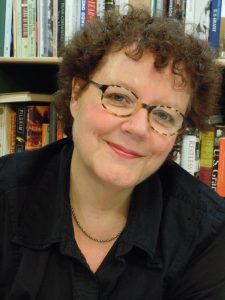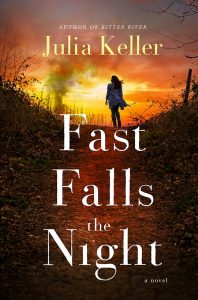Julia Keller earned a doctorate in English Literature at Ohio State University and is a former culture critic for the Chicago Tribune w here she won a Pulitzer Prize for a three-part narrative series about a deadly tornado that struck a small town in Illinois. She is a recipient of a Nieman Fellowship at Harvard University, and contributes on-air essays to NPR.
here she won a Pulitzer Prize for a three-part narrative series about a deadly tornado that struck a small town in Illinois. She is a recipient of a Nieman Fellowship at Harvard University, and contributes on-air essays to NPR.
Fast Falls the Night covers 24 hours in Acker’s Gap, West Virginia, a town facing a wave of fatal heroin overdoses. Bell Elkins, a county prosecutor, realizes her Appalachian hometown is facing a terrible challenge because the fatal overdoses are caused by heroin laced with a lethal tranquilizer. The novel occurs against the backdrop of a shattering personal revelation that will change Bell’s life forever.
I understand the premise of “Fast Falls the Night” is based on a true event. Tell us about that.
I was in my hometown of Huntington, West Virginia on August fifteenth, 2016, The town has fallen on very hard times, which have been exacerbated by the ongoing opioid epidemic and escalating heroin use. The town was virtually unrecognizable to me. It was a singular day in the history of Huntington: it was the day when there were twenty-eight drug overdoses within twenty-four-hours. Two of them resulted in fatalities. A bad batch of heroin, laced with a lethal tranquilizer, had begun to circulate through the town.
You portray the Appalachian town of Acker’s Gap as a place of quiet desperation. You focus on a twenty-four-hour period of time. Tell us more.
period of time. Tell us more.
Acker’s Gap is a fictional town, much smaller than Huntington, but I constructed it with my hometown in mind. I was so struck by what actually happened during the course of twenty-four hours in Huntington, I decided to scrap the format of the novel I’d already started, and began writing again, placing everything within a twenty-four hour period of time.
“Fast Falls the Night” is told through the eyes of different characters—a sheriff, a prosecutor, an EMT technician, a preacher, among others. What are the advantages of this method of storytelling?
In telling the story of Fast Falls the Night, I realized the novel had to be told from multiple points of view. I wanted to portray a shifting kaleidoscope of woe, so the reader sees everything that’s happening in the town—the troubles and tragedies—from multiple perspectives. It seemed a perfect template to explore one of the great moral issues of our time: with limited financial resources, what should we do? Do we rescue addicts for the eighth or ninth time, using our scarce resources, or do we say, ‘They brought this on themselves?’
This has been argued in state legislatures, and we each argue it in our heart and soul. What do we owe other people? To me, the answer is clear: we all deserve as many chances as we’re willing to ask for. There’s a great moral crisis in our country now—and the novel tells the story of what people owe each other, but on a smaller scale.
To go back to your first question, this novel was born out of reality but blossomed into fiction, which is where I believe social issues can be explored and debated in as worthy a manner as they can be in real life.
Tell us about your journey to becoming a published novelist.
I always intended to be a novelist. All the great twentieth-century writers I admired started out as journalists—Hemingway, Willa Cather, and Katherine Anne Porter—all had newspaper backgrounds. I thought that’s what you do: you work for a newspaper and learn about the world by putting yourself in experiences you would never otherwise have. That’s what I did and really enjoyed it. I worked for the Columbus Dispatch and then for the Chicago Tribune. After I won the Pulitzer Prize, I heard from agents who asked if I would be interested in writing a book. I said I would, but told them I wanted to write fiction. A few of them ran screaming from that notion, but some stuck around. I’ve always felt fiction is superior to non-fiction. Non-fiction lives for a day, but good fiction can live forever. After all, we’re still reading Homer. That was my journey to where I am now. I left the Tribune in 2012, and have been able to support myself by writing.
What’s a typical writing day like for you?
I’m an early riser. After copious cups of coffee, I sit down and write. I’m very much a morning writer. I’ve had to become an evening writer as well due to deadlines. [Laughter].
Your prose is quite lyrical. Who are your literary influences?
In the twentieth century, I would have to say the biggest influences for me have been Willa Cather and Edith Wharton. Reading Cather’s Song of the Lark was a revelatory experience for me. It has so much to say about young people and their dreams.
Which contemporary authors do you enjoy reading?
I enjoy reading books by John le Carre and I think Dennis Lehane is a great novelist. There’s also a British novelist, Sarah Hall, whose book I read recently and I’m now reading virtually everything she ever wrote. I also enjoy novels by Helen Dunmore, who recently died. I also love novels by an Australian novelist, Peter Temple. His sentences are beautifully sculpted.
If you could read any one novel again as though reading it for the first time, which one would it be?
That’s an easy one for me to answer: An American Tragedy by Theodore Dreiser, which I read in high school. The emotional impact of that novel and the social issues it explored have stayed with me all these years.
What’s coming next from Julia Keller?
I’m writing a young adult trilogy. The first novel, The Dark Intercept, is set in a future world where the government can harvest and archive our emotions and when it seeks to control us, sends intense emotions back into us.
Congratulations on penning “Fast Falls the Night”, a beautifully crafted novel filled with insights about the human condition and populated by fully realized and tragic characters.




